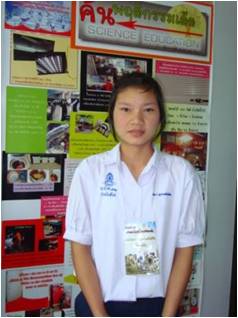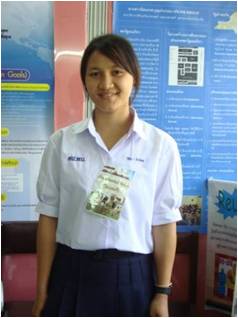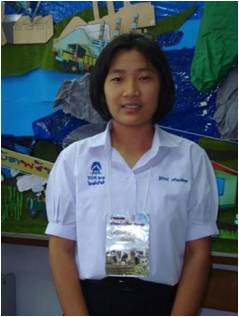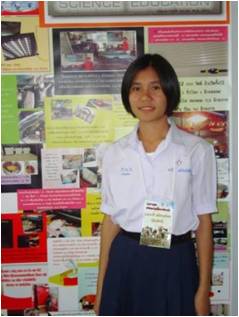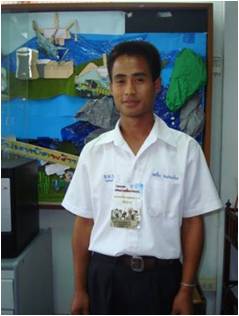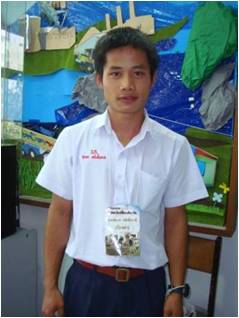บทความเทิดพระเกียรติ
ตามรอยพระยุคลบาทเพื่อการพัฒนา ๕๕ พรรษา
เจ้าฟ้ามหาจักรีสิรินธร
"ข้าพเจ้าโตขึ้นมาในช่วงที่ประเทศไทยประสบปัญหาหลายอย่างโดยเฉพาะอย่างยิ่งในแง่ที่ว่าประชา ชนพี่น้องร่วมชาติในเขตทุรกันดารห่างไกลการคมนาคมมีความเป็นอยู่ที่ยากลำบาก ได้รับบริการของรัฐน้อย ต้องประสบอันตรายจากโจรผู้ร้ายและการสู้รบ พระบาทสมเด็จพระเจ้าอยู่หัวและสมเด็จพระนางเจ้าฯ พระบรมราชินีนาถทรงใช้เวลาส่วนใหญ่เสด็จพระราชดำเนินไปเยี่ยมท้องที่เหล่านี้เพื่อพระราชทานพระบรม ราชานุเคราะห์แก่ราษฎรในด้านต่าง ๆ เช่น การประกอบอาชีพเพื่อให้เกิดรายได้ การรักษาพยาบาล การศึกษา การแก้ไขปัญหาขัดข้องต่าง ๆ ฯลฯ
ข้าพเจ้ามีหน้าที่ในการสัมภาษณ์ประชาชนเพื่อพระราชทานความช่วยเหลือ มีผู้ตั้งคำถามว่าทราบได้ อย่างไรว่าคนนั้นเป็นคนยากจนจริง อาจจะมากราบบังคมทูลความเท็จ สวมเสื้อผ้าปอน ๆ ให้ดูยากจน เราใช้เกณฑ์ว่าสิ่งใดที่เราพอจะช่วยเหลือเขาได้โดยไม่สร้างความเดือดร้อนกับคนอื่นเราก็ช่วย รายที่ต้องช่วยก่อน คือรายที่มีปัญหาเรื่องสุขภาพ เพราะมองเห็นได้พอสมควร ถ้าพอมีประสบการณ์ก็จะทราบว่าคนไหนเจ็บป่วย เรื่องนี้เสแสร้งได้ยากการที่ได้รู้เห็นอย่างกว้างขวางเช่นนี้ทำให้ข้าพเจ้าตั้งความหวังว่าเมื่อโตเป็นผู้ใหญ่จะต้อง มีส่วนร่วมในการแก้ไขปัญหาต่าง ๆ ให้ได้…"
พระราชนิพนธ์สมเด็จพระเทพรัตนราชสุดาฯ สยามบรมราชกุมารี
เกี่ยวกับตำรวจตระเวนชายแดน พ.ศ. 2551
การตามรอยพระยุคลบาทเพื่อการพัฒนาของสมเด็จพระเทพรัตนราชสุดาฯ สยามบรมราชกุมารี ในครั้งนี้ ได้ข้อมูลจากโครงการวิจัย "ภาษาศาสตร์ภาษากะเหรี่ยง" ซึ่งได้รับทุนสนับสนุนจากฝ่ายวิชาการ สำนักงานกองทุนสนับสนุนการวิจัย (สกว.) โดยศาสตราจารย์ ดร. ธีระพันธ์ เหลืองทองคำ จากภาควิชาภาษาศาสตร์ คณะอักษรศาสตร์ จุฬาลงกรณ์มหาวิทยาลัย หัวหน้าโครงการได้นำคณะผู้วิจัยลงพื้นที่ศึกษาภาษา วัฒนธรรม และความเป็นอยู่ของชาวกะเหรี่ยง ซึ่งในปัจจุบันมีชาวกะเหรี่ยงตั้งถิ่นฐานกระจายอยู่ใน 15 จังหวัด แถบบริเวณภาคเหนือและภาคตะวันตกของประเทศไทย ตั้งแต่เชียงรายจนถึงประจวบคีรีขันธ์ ราว 500,000 คน ข้อมูล อีกส่วนหนึ่งเป็นข้อมูลที่ได้รับความอนุเคราะห์จากสำนักงานโครงการสมเด็จพระเทพรัตนราชสุดาฯ สยามบรมราชกุมารี ในส่วนพระฉายาลักษณ์สมเด็จพระเทพรัตนราชสุดาฯ สยามบรมราชกุมารีเป็นภาพพระราชทาน และได้รับพระราชานุญาตให้นำเสนอในบทความนี้
แม้พระราชปณิธานแห่งองค์สมเด็จพระเทพรัตนราชสุดาฯ สยามบรมราชกุมารีจะทรงมุ่งที่จะช่วย เหลือผู้ยากไร้โดยเสมอภาค ไม่เจาะจงเฉพาะกลุ่มชาติพันธุ์ใดชาติพันธุ์หนึ่ง แต่บทความนี้จะขอนำเสนอเฉพาะพระราชกรณียกิจและโครงการในพระราชดำริที่เกี่ยวเนื่องกับชาวกะเหรี่ยงเท่านั้น
กะเหรี่ยงเป็นชนพื้นเมืองดั้งเดิมของเอเชียตะวันออกเฉียงใต้แผ่นดินใหญ่ (Mainland Southeast Asia) ตั้งถิ่นฐานเป็นแนวยาวจากเหนือลงใต้ในเขตแดนไทยพม่าตั้งแต่สมัยก่อนประวัติศาสตร์ ต่อมาในยุคล่าอาณานิคม ผืนแผ่นดินซึ่งเป็นที่อยู่อาศัยของคนกะเหรี่ยงได้ถูกแบ่งออกเป็น 2 ส่วน เนื่องจากการทำแผนที่ของชาติตะวันตก โดยส่วนหนึ่งอยู่ในสหภาพพม่า อีกส่วนหนึ่งอยู่ในประเทศไทย เป็นเหตุให้เกิดการแบ่งออกเป็นกลุ่มกะเหรี่ยงพม่า (Burmese Karen) และกลุ่มกะเหรี่ยงไทย (Thai Karen) โดยในสหภาพพม่ามีจำนวนประชากรกะเหรี่ยงราว 3.7 ล้านคน ในขณะที่ประเทศไทย มีประชากรกะเหรี่ยงราว 500,000 คน ชาวกะเหรี่ยงในประเทศไทยแบ่งออกเป็นกะเหรี่ยงที่อาศัยอยู่ในประเทศไทยมาช้านานบางส่วนได้ผสมกลมกลืนกับคนไทยทั่วไป กับกะเหรี่ยงกลุ่มที่เพิ่งอพยพมาจากสหภาพพม่าเข้ามาอยู่ใหม่ ด้วยเหตุผลบางประการ อาทิ อดอยากยากแค้น เกิดสงครามภายใน หรือกลุ่มธุรกิจท่องเที่ยวนำเข้ามา ได้แก่ กลุ่มปะโอหรือตองสู (Pa'O / Tongthu) กะยา (Kayah) กะยัน (Kayan) หรือกะเหรี่ยงคอยาว และกะยอ (Kayaw) หรือกะเหรี่ยงหูใหญ่ โดยกะเหรี่ยงที่ตั้งถิ่นฐานในประเทศไทยส่วนใหญ่นั้นเป็นกลุ่มกะเหรี่ยงโป (Pwo) หรือโผล่ง และกลุ่มกะเหรี่ยงสะกอ (Sgaw) หรือปากะญอ ซึ่งเป็นกลุ่มที่ได้เข้ามาตั้งถิ่นฐานในประเทศไทยก่อนกระเหรี่ยงกลุ่มอื่น ๆ
สมเด็จพระเทพรัตนราชสุดาฯ สยามบรมราชกุมารี ทรงมีพระมหากรุณาธิคุณเป็นล้นพ้นต่อชาวกะเหรี่ยง พระองค์มีพระราชดำริให้อนุรักษ์วัฒนธรรมท้องถิ่นชาวกะเหรี่ยง โดยทรงเห็นว่ากะเหรี่ยงมีวิถีชีวิตที่สอดคล้องกับธรรมชาติ มีวัฒนธรรมประเพณีที่สืบทอดมาอย่างยาวนาน ภูมิปัญญากะเหรี่ยงมีเอกลักษณ์เฉพาะตัวซึ่งนับวันมีแต่จะสูญหายไป
แต่ทว่าการตั้งถิ่นฐานในถิ่นทุรกันดาร ห่างไกลความเจริญ เป็นเหตุให้ชาวกะเหรี่ยงส่วนใหญ่ ดำเนินชีวิตอย่างแร้นแค้น หลายคนยังคงเป็นคนไร้สัญชาติแม้จะอาศัยอยู่ในประเทศไทยมาหลายสิบปี การเป็นคนไร้สัญชาติ เป็นเหตุให้พวกเขาเหล่านั้นไม่สามารถขอรับความช่วยเหลือที่จำเป็นต่อการดำรงชีวิตจากภาครัฐทั้งในด้านสาธารณสุข ด้านการศึกษา หรือด้านการส่งเสริมพัฒนาอาชีพ ฯลฯ ได้
ในปี พ.ศ. 2523 สมเด็จพระเทพรัตนราชสุดาฯ สยามบรมราชกุมารี ได้ทรงเริ่มงานพัฒนาของพระองค์ตามพระราชปณิธานเมื่อครั้งทรงพระเยาว์ที่ได้ตามเสด็จพระบาทสมเด็จพระเจ้าอยู่หัวและสมเด็จพระนางเจ้าพระบรมราชินีนาถไปทรงงานในถิ่นทุรกันดาร พระองค์ทรงเริ่มงานพัฒนาเด็กแและเยาวชนก่อน ด้วยทรงตระหนักว่าเด็กและเยาวชนเป็นพลังสำคัญของประเทศในอนาคต โดยเริ่มจากทรงทดลองทำโครงการเกษตรเพื่ออาหารกลางวันในโรงเรียนตำรวจตระเวนชายแดน 3 แห่งในจังหวัดกาญจนบุรี ราชบุรี และประจวบคีรีขันธ์ โดยทั้งสามจังหวัดที่ทรงริเริ่มโครงนี้ล้วนเป็นจังหวัดที่มีชาวกะเหรี่ยงตั้งถิ่นฐานอยู่เป็นจำนวนมาก ในด้านการส่งเสริมด้านโภชนาการ ทรงให้ความสำคัญกับการเรียนรู้วัฒนธรรมการกินของแต่ละชนเผ่าดังพระราชนิพนธ์เกี่ยวกับตำรวจตระเวนชายแดนตอนหนึ่งว่า
"การที่มีเด็กหลายเผ่าในโรงเรียนทำให้การส่งเสริมโภชนาการยาก วัฒนธรรมการกินของแต่ละเผ่าต่างกัน เราต้องไปลองกินอาหารกับชาวบ้าน เพื่อให้ทราบรสนิยมของเขาและดัดแปลง เติมของมีประโยชน์เข้าไป ปัจจุบันไม่สู้เป็นปัญหามากนัก นักเรียนปรับตัวในเรื่องการบริโภคได้ดีขึ้น"
เมื่อครูผู้ปกครองและนักเรียนที่ร่วมโครงการมีความรู้และทักษะด้านเกษตรแผนใหม่ สามารถทำการเกษตรในโรงเรียนและรู้จักนำผลผลิตที่ได้มาประกอบเป็นอาหารกลางวันรวมทั้งมีภาวะโภชนาการและสุขภาพดียิ่งขึ้น ในปีต่อมาจึงทรงขยายงานไปยังโรงเรียนตำรวจตระเวนชายแดนทั่วประเทศ ด้วยทรงเห็นว่าโรงเรียนตำรวจตระเวนชายแดนคือตัวแทนของโรงเรียนในถิ่นทุรกันดาร
นอกจากจะทรงส่งเสริมด้านโภชนาการแล้ว สมเด็จพระเทพรัตนราชสุดาฯ สยามบรมราชกุมารี ได้ทรงดำเนินโครงการส่งเสริมคุณภาพการศึกษาในปี พ.ศ. 2526 เพื่อส่งเสริมคุณภาพการเรียนการสอน วัสดุอุปกรณ์ ตลอดจนปรับปรุงอาคารสถานที่ ต่อมาในปี พ.ศ. 2531 พระองค์ได้ทรงดำเนินโครงการนักเรียนในพระราชานุเคราะห์ สมเด็จพระเทพรัตนราชสุดาฯ สยามบรมราชกุมารี ปัจจุบันในแต่ละปีพระองค์ได้พระราชทานทุนการศึกษากว่า 200 ทุน แก่นักเรียนที่จบชั้นประถมปีที่ 6 ที่มีผลการเรียนอยู่ในเกณฑ์ดีแต่ขาดโอกาสในการศึกษาต่อเนื่องจากครอบครัวฐานะยากจนหรือประสบปัญหาครอบครัว เพื่อที่ว่าเมื่อนักเรียนในพระราชานุเคราะห์เหล่านี้สำเร็จการศึกษาจะได้นำความรู้ไปประกอบอาชีพหรือกลับมาพัฒนาท้องถิ่นของตนเองสืบไป ในแต่ละปีพระองค์ได้พระราชทานทุนการศึกษารวมกว่า 30 ล้านบาท โดยรายได้จากการจำหน่ายหนังสือพระราชนิพนธ์และรายได้ส่วนหนึ่งจากการจำหน่ายสินค้าของร้านภูฟ้าได้นำมาเป็นทุนการศึกษาแก่เด็กผู้ด้อยโอกาสเหล่านี้
คณะผู้วิจัยได้มีโอกาสติดตามนักเรียนในพระราชานุเคราะห์จำนวน 95 คนที่เข้าร่วมโครงการแนะแนวและเรียนเสริมที่โรงเรียนสาธิตแห่งจุฬาลงกรณ์มหาวิทยาลัย ในจำนวนนี้เป็นนักเรียนชาวกะเหรี่ยง จากทั่วประเทศจำนวน 16 คน เมื่อได้พูดคุยกับนักเรียนกลุ่มนี้ ก็สัมผัสได้ถึงความไม่ย่อท้อต่อชะตาชีวิต ความมุ่งมั่นและความตั้งใจจริงที่จะนำความรู้กลับไปพัฒนาท้องถิ่นตามรอยพระยุคลบาทสมเด็จพระเทพรัตนราชสุดาฯ สยามบรมราชกุมารี
ในด้านการส่งเสริมอาชีพ สมเด็จพระเทพรัตนราชสุดาฯ สยามบรมราชกุมารี ทรงพระกรุณาโปรด เกล้าฯ ให้สำนักงานโครงการสมเด็จพระเทพรัตนราชสุดาฯ สยามบรมราชกุมารี ดำเนินการฟื้นฟูและ พัฒนาความรู้การย้อมสีจากวัตถุดิบในท้องถิ่นมาใช้ย้อมเส้นด้าย และจัดอบรมเพื่อฝึกให้ชาวกะเหรี่ยงรู้จักคิดต้นทุน ทำบัญชี รู้จักวิธีแปรรูปเพื่อเพิ่มมูลค่าให้แก่สินค้า ผ้าทอมือของชาวกะเหรี่ยงซึ่งทอด้วยกี่เอวอันเป็นเอกลักษณ์ของชาวกะเหรี่ยง ได้นำมาพัฒนาเป็นสินค้าหลากหลายชนิด อาทิ ผ้าพันคอ ผ้าเช็ดหน้า ผ้าปูโต๊ะ ฯลฯ จำหน่ายที่ร้านภูฟ้า การเข้าร่วมโครงการเพื่อพัฒนากลุ่มอาชีพนอกจากจะช่วยยกระดับคุณภาพชีวิตชาวกะเหรี่ยงให้มีความเป็นอยู่ที่ดียิ่งขึ้นแล้ว ที่สำคัญยังทำให้ชาวกะเหรี่ยงได้กลับไปใช้ชีวิตร่วมกับธรรมชาติตามวิถีดั้งเดิมอย่างยั่งยืนอีกด้วย
พระราชกรณียกิจด้านการพัฒนาของสมเด็จพระเทพรัตนราชสุดาฯ สยามบรมราชกุมารีที่มีต่อผู้ ยากไร้ในถิ่นทุรกันดารที่ทรงดำเนินผ่านโครงการต่าง ๆ อย่างต่อเนื่องเกือบสามทศวรรษ ทำให้ความแตกต่างทางด้านชาติพันธุ์ไม่ใช่ความแตกต่างกันระหว่างผู้ที่ตั้งถิ่นฐานร่วมกันบนผืนแผ่นดินไทย หากผู้มีโอกาสต่างช่วยเหลือเกื้อกูลผู้ด้อยโอกาสตามรอยพระยุคลบาทแห่งพระองค์ สังคมไทยก็คงจะเป็นสังคมที่น่าอยู่ สงบ สันติแห่งหนึ่งของโลก...
Following the Royal Development Path:
H.R.H. Princess Maha Chakri Sirindhorn's Fifty-Fifth Birthday
"I grew up at a time when Thailand faced many problems, especially those concerning our deprived countrymen living in remote areas far away from any means of public communication. They suffered from hardships and difficulties and rarely received any services from the Government. They lived under the threat of criminal activity and fights. Their Majesties the King and Queen spent most of their time visiting these remote areas to give help to these people by promoting their occupations in order to create income and by providing education, medical care and services, and eliminating their minor problems.
I was assigned with the duty of interviewing the people before help was given to them. Some asked me how I could tell that these people were really poor. They might have been lying to me and wearing worn-out clothes to look poor. The kind of measure I used was the resolution to help them if we could as long as the help did not cause other people trouble. Priority would go to those who had health problems because their need was quite evident. If you have some experience, you can see right away who is sick and, anyway, it is difficult to pretend to be sick. Having been extensively exposed to the people's problems, I wished that I would be able to take part in solving social problems when I grew up."
H.R.H. Princess Maha Chakri Sirindhorn writing about the Border Patrol Police, 2008
The information about the royal development path of H.R.H. Princess Maha Chakri Sirindhorn has been obtained from the "Karen Linguistics Project," which is financially supported by the Academic Section of the Thailand Research Fund (TRF). The project is chaired by Professor Theraphan Luangthongkum, Ph.D. of the Department of Linguistics, The Faculty of Arts, Chulalongkorn University. In order to study the language, culture and the way of life of the Karen, Professor Theraphan and her research team have made field trips to the Karen communities that are scattered over fifteen provinces in the North and the West of Thailand, from Chiang Rai to Prachuap Khiri Khan. The size of the Karen population is approximately 500,000. Other pieces of the information are derived from the Office of H.R.H. Princess Maha Chakri Sirindhorn's Development Projects.
Though it is H.R.H. Princess Maha Chakri Sirindhorn's determination to provide assistance to the deprived without discrimination because of their race or ethnic background, this article intends to focus only on Her Royal Highness's activities and projects related to the Karen.
The Karen are an indigenous tribe living in Mainland Southeast Asia. Karen natives have settled, since the pre-historic period, in an area that forms a long strip from North to South on the Thai-Burmese Border. During the time of Western colonization, the Karen settlement was divided into two parts on the Western map. One part was in the Union of Burma and the other in Thailand. This resulted in two groups of Karen—the Burmese Karen and the Thai Karen. The population of the Burmese Karen numbers approximately 3.7 million whereas that in Thailand numbers about 500,000. The Karen in Thailand are divided into those who have lived here for a long time and have assimilated with the general Thai population and those who have recently migrated from Burma for a variety of reasons—hunger and hardship, internal warfare or the tourist trade. The Karen from Burma consist of the Pa'O or the Tongthu, the Kayah, the Kayan or the Long-Necked Karen and the Kayaw or the Large Ear-Lobed Karen. Those settling in Thailand are the Pwo and the Sgaw, who settled in Thailand before other groups.
H.R.H. Princess Maha Chakri Sirindhorn's benevolence to the Karen is evident in her initiative to conserve their local culture because she views their life as a way of life that is harmonious with nature. Their traditions and customs have long continued from one generation to another and their folk wisdom is unique. All these need to be conserved before they vanish.
The fact that most of the Karen settlements are a long way from advanced areas causes many difficulties, hardships and deprivations in their lives. Some have no nationality though they have lived in Thailand for decades. This makes them ineligible for aid from the government sector in terms of public health, education or occupational promotions.
In 1980, H.R.H. Princess Maha Chakri Sirindhorn, as a result of her determination in her youth when accompanying her parents to work in rugged areas of the country, launched her development projects. Her work started with the development of children and young people since they were to become a major power in the future of the country. She began by experimenting on the Agriculture for Lunches Project in three Border Patrol Police schools in Kanchanaburi, Ratchaburi and Prachuab Kiri Khan Provinces, where there were large numbers of Karen. When promoting nutrition, Her Royal Highness emphasized the significance of the eating culture of each tribe, as can be seen in her writing about the Patrol Border Police:
"As children in the school were from different tribes, it was difficult to promote the nutrients in their food. Each had a different eating culture. So we had to try what these people ate in order to know their tastes and then made adjustments by adding nutritional ingredients to their food. Right now, this is no longer a major problem. Students are better able to adjust themselves in terms of eating."
Once guardian teachers and students in the royal project had more knowledge and skill in the new kind of agriculture, they were able to grow plants in their school grounds and make use of the agricultural produce to prepare lunches for students so that their nutritional and health conditions improved. Later, Her Royal Highness expanded her project to cover all Border Patrol Police schools across the country because she considered these schools were representatives of schools in the rugged areas.
As well as promoting food nutrition, in 1983, H.R.H. Princess Maha Chakri Sirindhorn launched a project to promote education in order to improve the quality of education, materials and also buildings and locations. In 1988, she established the Students under the Patronage of H.R.H. Princess Maha Chakri Sirindhorn Project. Currently, she has granted more than 200 scholarships to Prathom Sueksa 6 graduates who have a good academic record but are unable to continue studying because their families are poor or have problems. After finishing their studies, these scholarship students will be able to pursue their careers or go back to develop their locality. Each year, the Princess allocates more than 30 million Baht for scholarships to these students. The money comes from the sale of her publications and merchandise in Phu Fa stores.
The research team had the chance to follow 95 students who are under the royal patronage and had joined the Counseling and Educational Promotion Project at Chulalongkorn University's Demonstration School. Among these students were 16 Karen students from all over the country. After talking to them, we found that they were determined never yield to the hardship in their life. They intended to work hard and were going to return home to develop their community, following the example of Her Royal Highness.
In terms of occupational promotion, Her Royal Highness Princess Maha Chakri Sirindhorn has had the Office of the H.R.H. Princess Maha Chakri Sirindhorn's Development Projects revived and has developed the knowledge of making dyes from local raw materials, organized training in how to calculate the cost of products and keep the books and how to improve the goods to add value to them. Hand-woven materials, made from the Karen's unique waist-loom, have been made into different kinds of items; for example, scarves, handkerchiefs and table-cloths – all of which are for sales at Phu Fa stores. Participation in the Project for the Development of Occupational Groups has not only helped to improve the quality of life of the Karen but has also enabled them to live in harmony with nature in keeping with their traditional way of life.
Her Royal Highness Princess Maha Chakri Sirindhorn's development activities that have been implemented through different projects over a period of almost three decades make it evident that variations in race and ethic background do not differentiate between those who live in Thailand. If those who have the chance to help the deprived would follow the royal path, Thai society would be a better, more pleasant and peaceful society.
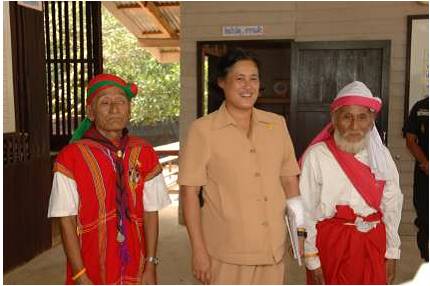
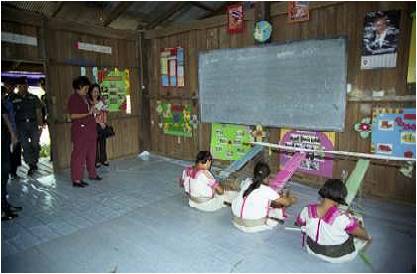
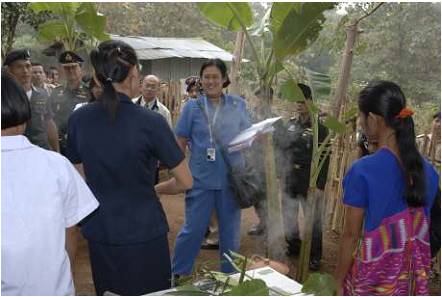

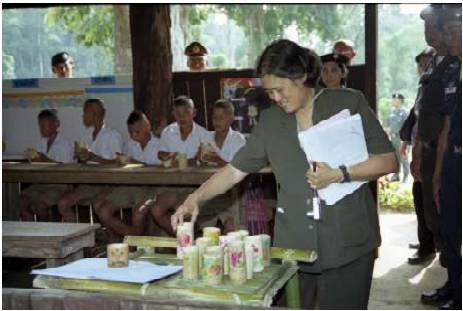
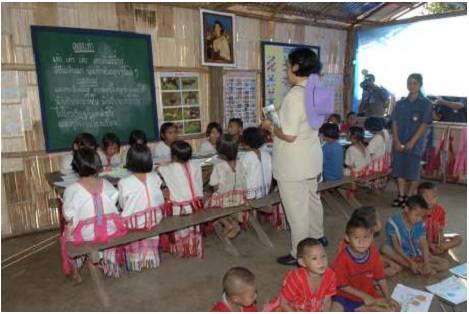


หนึ่งในโครงการอนุรักษ์ธรรมชาติและสิ่งแวดล้อมเพื่ออนุรักษ์ทรัพยากรในท้องถิ่น The Natural Science Park in Ratchaburi Province, established by H.R.H. Princess in the past Maha Chakri Sirindhorn's initiative, presenting the Karen community's way of life in the past and the sorting of minerals.
This is part of the Project for the Conservation of Nature and the Environment for the Conservation of Local Resources.
นักเรียนชาวกะเหรี่ยงในพระราชานุเคราะห์
Karen Students under the Royal Patronage
